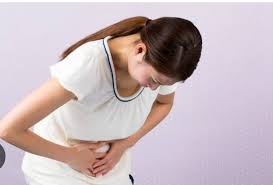
Menstruation is a natural process of a woman's body in which the inner walls of the womb (uterus) are drained of blood through the vagina. This happens every month if there is no pregnancy, and is part of the menstrual cycle.
Important Facts About Menstruation:
1. Occurs Every Month: Normally, menstruation occurs every 21-35 days, but the average is 28 days.
2. Lasts 2-7 Days: Every woman has a different length of period.
3. Blood Source: It is a mixture of blood, cervical mucus, and tissue from the walls of the uterus.
4. Controlled by Hormones: Hormones like estrogen and progesterone control the menstrual process.
5. It can be accompanied by various symptoms: such as stomach pain, back pain, mood swings, fatigue, and breast swelling.
Severe pain during menstruation (dysmenorrhea) can be caused by various reasons, including:
1. Increased Prostaglandins
These are chemicals produced by the body to help the muscles of the womb (uterus) contract and produce menstrual blood.
High levels of prostaglandins can cause severe cramps and severe pain.
2. Endometriosis
A condition where tissues similar to those inside the uterus grow outside the uterus.
It can cause severe pain before, during, and even after menstruation.
3. Fibroids
It is a non-cancerous tumor that can grow on the walls of the uterus.
It can cause heavy menstruation and severe pain.
4. Adenomyosis
A condition where tissue inside the uterus grows inside the muscles of the uterus.
This leads to more painful and heavier periods.
5. Hormonal problems
Unbalanced levels of hormones, especially estrogen and progesterone, can cause more pain during menstruation.
6. Reproductive Problems
Genitourinary tract infection (PID) can cause swelling and severe pain during menstruation.
7. Use of Family Planning Methods
Some contraceptive methods, such as sticks or intrauterine devices (IUDs), can increase pain during menstruation.
8. Stress and Depression
Stress can make menstrual cramps worse because of its effects on hormones and the body as a whole.
9. Lifestyle
Lack of exercise, poor diet, excessive alcohol or caffeine consumption, and lack of sleep can increase menstrual cramps.
If the pain is very severe and does not go away even after using pain relievers, it is better to see a doctor for further examination.


0 Comments: